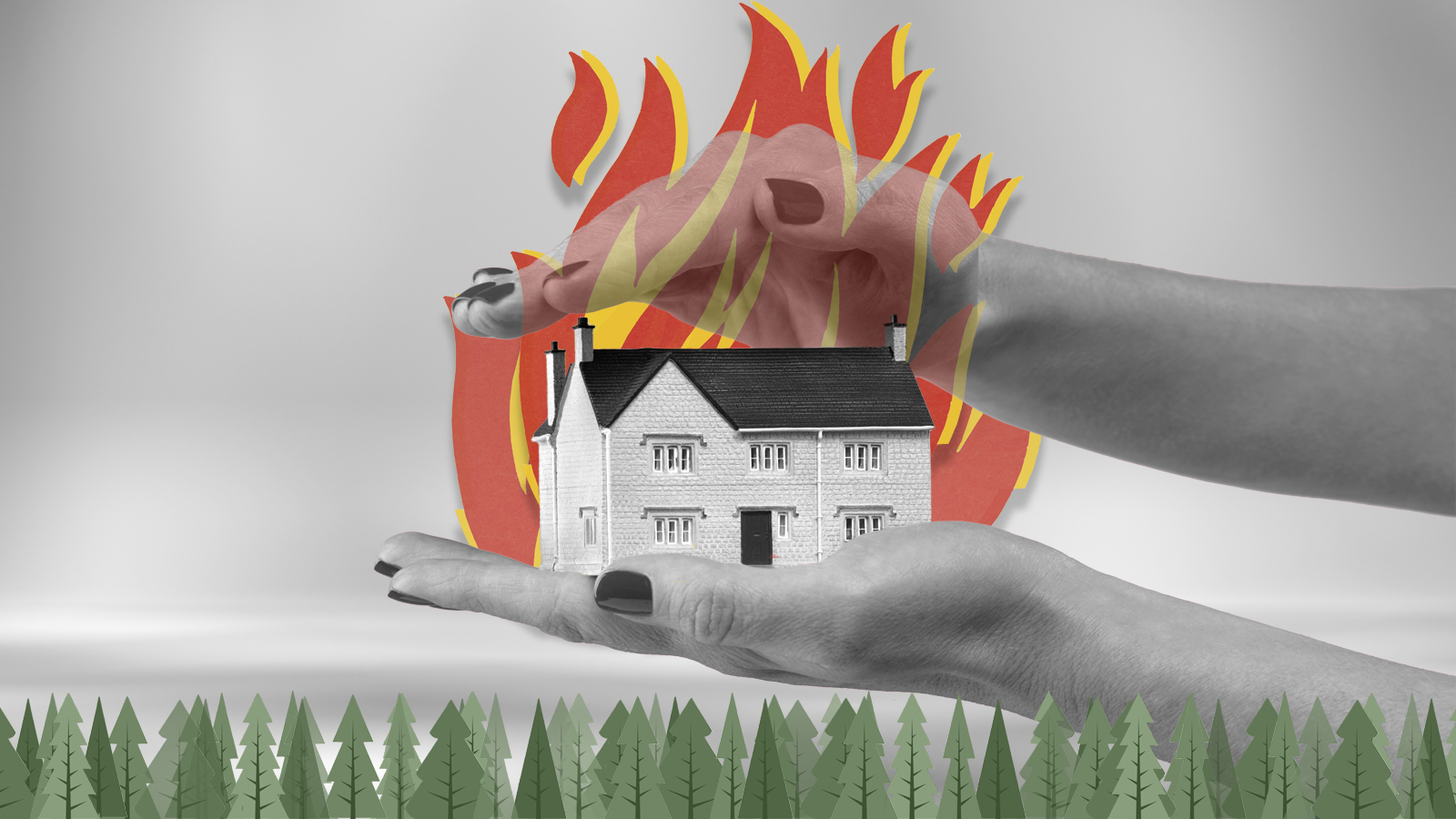Will climate change make homeownership harder?
State Farm has stopped offering new home insurance policies in California due to wildfire threat. It won't be the last.


A free daily email with the biggest news stories of the day – and the best features from TheWeek.com
You are now subscribed
Your newsletter sign-up was successful
Climate change is making life harder — and potentially much more expensive — for California homeowners. State Farm will no longer sell new home insurance policies in the Golden State, CalMatters reported, "the latest development in a wildfire-fueled crisis" that destroyed more than 11,000 structures in 2020 alone. State Farm isn't the only company pulling back in California: Allstate "quietly" stopped writing homeowner policies last year, the San Francisco Chronicle reported.
"Insurance companies are struggling to keep up" with the pace of climate-driven disasters, Politico reported, and California's insurance rules have complicated the matter: The state limits how fast rates can increase, making it more difficult for insurers to remain profitable while facing large payouts on a regular basis. State Farm's decision to pull back is an inflection point that "threatens the broader economic picture of California," one expert told E&E News.
But it's not just California. The New York Times reported that because of climate factors, Florida, Kentucky, Louisiana and other parts of the United States are seeing insurance rates rise quickly in the places it's still available. (Louisiana and nine other states just sued the federal government to prevent sharp new rate increases in the federal National Flood Insurance program.) That's "making it more expensive for people to live in their homes" and could result in policymakers choosing to move residents "out of the most dangerous communities." How will the climate crisis change home ownership in California and beyond?
The Week
Escape your echo chamber. Get the facts behind the news, plus analysis from multiple perspectives.

Sign up for The Week's Free Newsletters
From our morning news briefing to a weekly Good News Newsletter, get the best of The Week delivered directly to your inbox.
From our morning news briefing to a weekly Good News Newsletter, get the best of The Week delivered directly to your inbox.
What are the commentators saying?
"Climate risk is driving insurer decisions like never before," economist Benjamin Keys wrote at The New York Times. Insurance companies have recently faced about 20 climate-related disasters a year with payouts exceeding $1 billion, and those increased costs are showing up on bills: The average cost of a home insurance policy is now $1,900 a year — but in places like Miami, threatened by coastal flooding, the price tag reaches $5,000 annually. The risks are only going to increase. And that means homebuyers "need to be aware that the costs of living in harm's way are going to rise in coming years."
The Golden State finds itself in this mess because of a 1988 initiative "that gave the insurance commissioner near-dictatorial powers to set and roll back rates," Steven Greenhut argued in the Orange County Register. In 2016, State Farm sought a 6.9-percent rise in rates, but the commissioner ordered a decrease instead. A court eventually sided with the company, but the state's policy structure makes it more difficult for insurers to recoup their growing fire-related costs. "Given this rigged market, is it surprising that insurance companies are looking for the exit doors?"
All this means the state's human landscape may need to be re-imagined. "California's insurance dilemma is actually the result of two colliding crises," Alissa Walker wrote at Curbed. Even as the state faces a brutal cycle of wildfires, the state's "NIMBY resistance to denser housing" has pushed sprawling new developments closer to flammable wildland regions at the fringe Golden State cities. That's no longer tenable. Officials should "subsidize affordable housing in safer places, instead of supporting an increasingly unaffordable cycle of destruction."
What's next?
California is already facing "gentrification by fire," The Washington Post reported. Even before State Farm announced its decision, many wildfire victims in California lacked the financial resources to rebuild. The folks who stayed are the "well-off and the well-insured, a trend helping remake and re-sort communities across the state by rich and poor." That process may already be driving less-wealthy homeowners to sell their property and leave the state — or could do so soon. One recent poll showed that two-thirds of Californians fear that in coming years "they may need to move away from their homes due to extreme weather events," the Los Angeles Times reported.
A free daily email with the biggest news stories of the day – and the best features from TheWeek.com
As many as 50 million Americans are expected to eventually flee to temperate regions like New England and the Upper Midwest as areas like California get hotter and other coastal regions become more flood-prone, Yale Climate 360 reported. A recent survey of new Vermont residents found that many had come to the state to avoid climate problems elsewhere. "They were imagining Vermont would be cooler, and have more seasonality, and have more water available to them, and not have wildfire smoke," said the University of Vermont's Cheryl Morse.
In the meantime, State Farm's existing California policyholders will get to keep their insurance. But they may also find themselves worse off for the company's decision: Prospective new homebuyers will find it more challenging to obtain affordable insurance policies. Which means there might be fewer homebuyers — and that could hit incumbents' wallets. "If you can't get insurance, it's almost impossible to get a mortgage," Arwa Mahdawi noted at The Guardian. "This makes it harder to sell your house and will make prices go down."
Joel Mathis is a writer with 30 years of newspaper and online journalism experience. His work also regularly appears in National Geographic and The Kansas City Star. His awards include best online commentary at the Online News Association and (twice) at the City and Regional Magazine Association.
-
 ‘The mark’s significance is psychological, if that’
‘The mark’s significance is psychological, if that’Instant Opinion Opinion, comment and editorials of the day
-
 How did ‘wine moms’ become the face of anti-ICE protests?
How did ‘wine moms’ become the face of anti-ICE protests?Today’s Big Question Women lead the resistance to Trump’s deportations
-
 Currencies: Why Trump wants a weak dollar
Currencies: Why Trump wants a weak dollarFeature The dollar has fallen 12% since Trump took office
-
 Can the UK take any more rain?
Can the UK take any more rain?Today’s Big Question An Atlantic jet stream is ‘stuck’ over British skies, leading to ‘biblical’ downpours and more than 40 consecutive days of rain in some areas
-
 As temperatures rise, US incomes fall
As temperatures rise, US incomes fallUnder the radar Elevated temperatures are capable of affecting the entire economy
-
 The world is entering an ‘era of water bankruptcy’
The world is entering an ‘era of water bankruptcy’The explainer Water might soon be more valuable than gold
-
 Climate change could lead to a reptile ‘sexpocalypse’
Climate change could lead to a reptile ‘sexpocalypse’Under the radar The gender gap has hit the animal kingdom
-
 The former largest iceberg is turning blue. It’s a bad sign.
The former largest iceberg is turning blue. It’s a bad sign.Under the radar It is quickly melting away
-
 How drones detected a deadly threat to Arctic whales
How drones detected a deadly threat to Arctic whalesUnder the radar Monitoring the sea in the air
-
 ‘Jumping genes’: how polar bears are rewiring their DNA to survive the warming Arctic
‘Jumping genes’: how polar bears are rewiring their DNA to survive the warming ArcticUnder the radar The species is adapting to warmer temperatures
-
 Environment breakthroughs of 2025
Environment breakthroughs of 2025In Depth Progress was made this year on carbon dioxide tracking, food waste upcycling, sodium batteries, microplastic monitoring and green concrete
